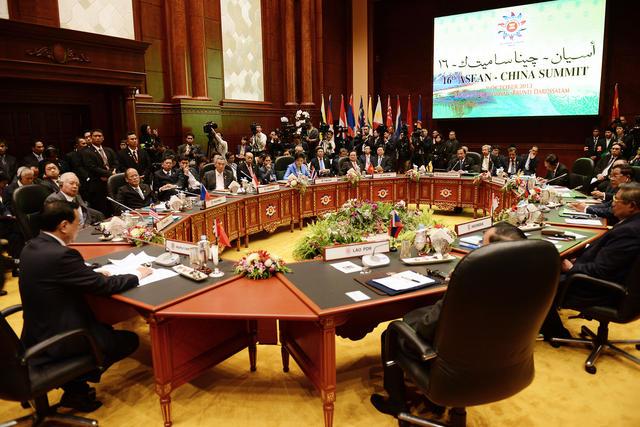 China has gone from peaceful rise to rising by pieces, as it smashes the nascent regional security order. Not much peace in prospect as China forcefully asserts its ownership over pieces of the East China and South China Seas.
China has gone from peaceful rise to rising by pieces, as it smashes the nascent regional security order. Not much peace in prospect as China forcefully asserts its ownership over pieces of the East China and South China Seas.
The irony is that the Asian order China’s ramming is one that has been a soft system, demanding little of Beijing and subject to Beijing’s effective veto. Beijing’s going from veto to vandal in an Asia system that has evolved in a China-friendly way for two decades. Driven by ASEAN, it has been a new order created by Asians for Asia. Mark that as another irony, with President Xi Jinping a fortnight ago arguing that ‘it’s for the people of Asia to run the affairs of Asia, solve the problems of Asia and uphold the security of Asia’. Unfortunately for the rest of Asia, Beijing’s actions mean those words are being interpreted to mean, ‘it’s for China to run the affairs of Asia’.
China’s assertiveness is bad news for the multilateral Asian order constructed using ASEAN building blocks—the East Asia Summit, the ASEAN Regional Forum and the ASEAN Defence Ministers Meeting.
The ASEAN Regional Forum, for instance, founded in 1994, now confronts the reality that two decades of confidence-building have produced precious little confidence. Remember that the ARF was always supposed to be a three-stage process:
- Confidence building
- Preventive diplomacy
- Conflict-resolution mechanisms.
Forget about stages two and three. Stage one is crumbling.
The commentaries, official and unofficial, are in sad agreement. The motif of 2014 for Asia is ‘mistrust’, according to a geopolitical overview by Singapore’s Institute of Southeast Asian Studies. The National Security Strategy issued by Japan in December lamented that the regional security framework hadn’t been institutionalised, and charged China with trying to ‘change the status quo by coercion in the maritime and aerial domains including the East China Sea and the South China Sea, [in ways] which are incompatible with the existing order of international law’. It’s the frame Shinzo Abe employed for his ‘we’re back’ speech on Japan again taking a security role in Asia.
The 2014 Regional Security Outlook published by the Council for Security Cooperation in the Asia Pacific, judges that after 25 years of effort, East Asia’s fight for a security community has to be rated, at best, as a draw. ‘In short,’ Ron Huisken writes, ‘we are not winning’. He describes the US and China slipping towards ‘mutually accepted adversity and antagonism’, as China finds it ‘hard to sustain its preferred image of a new model major power devoid of hegemonic aspirations and committed to stability and reassurance’.
The Regional Security Assessment released at the Shangri-La dialogue by the International Institute for Strategic Studies commented that the prospects for an institutionally based Asian security order ‘may be fading’ and ‘look much bleaker’ than they did five years ago. The evidence points to competition, not cooperation:
…much uncertainty hangs over the continued sustainability of the US-led order … it appears clear that rising China—although demanding greater regional influence commensurate with its growing power—is still neither willing to assume the leadership responsibilities traditionally expected of a hegemonic power nor able to replace the US as the region’s dominant power.
After more than two decades, Asia’s effort at security machinery or architecture—built by the middle powers but, until now, supported by the great powers—is confronting its limitations. If the first stage of this community is building confidence, then the stage is buckling; diplomatic socialisation, ASEAN norms and constant dialogue aren’t delivering.
The weak security system built by Asia has paid great homage to China’s prerogatives and granted Beijing an effective veto over progress and direction. The nascent system has been one of China’s many assets in its rise to the head of the region. Now that system is being damaged as China flexes its muscles over territory and national pride. Beijing seems little worried by brushing aside Asia’s multilateral security community.
Graeme Dobell is the ASPI journalist fellow. Image courtesy of InfoFoto.